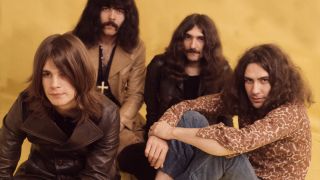For all its superstitious connotations, Friday, February 13, 1970 was an inauspicious day. The world kept turning as it always had. Politicians clashed, wars were fought in the name of religion, science continued its inexorable march forward, people were born, people died.
Actually, that’s not strictly true. Friday, February 13, 1970 was auspicious for one reason. It was the day that Black Sabbath released their first album and diverted the course of music forever.
These four former hippies from the streets of working-class Birmingham weren’t the first band to cotton on to the artistic and commercial value of turning up their amps – Led Zeppelin and Free both beat them to it. But Sabbath swapped those bands’ carnal fixations for something more apocalyptic and ominous.
They were a band of their times. A reaction to the lysergic libertarianism of the 60s, their songs were scorched with imagery of war, horror, mental illness and death. If Zeppelin were epic fantasists, then Sabbath were a shot of harsh reality.
But it was the music that separated them from all the other bands crawling from rock’s primordial soup. Darker and heavier than anything that had come before, Sabbath were a four-man industrial revolution whose aftershocks can still be felt today.
Their original visionary incarnation spanned the whole of the 70s, though it was the six landmark albums they released between 1970 and 1975 that cemented their reputation as one of the founding fathers of heavy metal and hard rock. The chaos that surrounded them was mirrored in their songs, even as the same chaos was pulling them apart.
There’s another Friday, February the 13th in 2015, but it’s unlikely any band will release a record on that day that will echo down the ages like the first Black Sabbath record did. Forty-five years on from that magnificent debut, this is the story of a decade in which four lunatics from Birmingham changed everything.
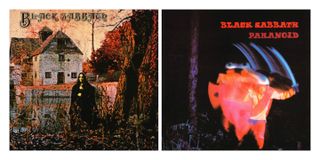
Nativity In Black: 1969-1971
The members of Black Sabbath had all played in various bands in Birmingham before they got together as the Polka Tulk Blues Band (later just Polka Tulk, and then Earth) in 1968, though they vaguely knew each other from their schooldays.
Tony Iommi (guitarist, Black Sabbath): I used to hate the sight of Ozzy. I couldn’t stand him, and I used to beat him up whenever I saw him. We just didn’t get on at school. He was a little punk.
Geezer Butler (bassist, Black Sabbath): The first time I met him [Ozzy], he came round my house with a chimney brush over his shoulder, his Dad’s factory gown on and no shoes. My brother went, “There’s something at the door for you.”
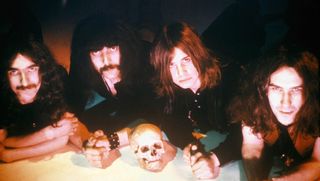
Black Sabbath had barely changed their name from Earth when they entered London’s Regent Studios in October 1969 to record an album’s worth of material with producer Rodger Bain. They had faced a struggle to get noticed – Earth had been turned down by 14 labels, before their manager Jim Simpson persuaded EMI to fund the session. Over 12 hours, they would unwittingly lay down the template for an entirely new strain of music.
Tony Iommi: The idea was to make an album heavier than anything that had ever been heard before. We wanted to make something different. The idea was to make the sound as big as we could for what we’d got. We were relying on Rodger Bain, because we’d never done a record before.
Bill Ward (drummer, Black Sabbath): I was bowled over by the way Rodger looked. He wore Converse sneakers and so did I. It was nothing about his skills as a producer. It was literally something like, “He looks pretty cool. All right.”
Tony Iommi: There was no time to keep going over the songs. We had one try and that was it. When we did Warning, we cocked it up. I said, “Can we do it again?” and Rodger said, “You can have one more go at it.” And that was it. It was a bit nerve-wracking.
Geezer Butler: I had a Laney guitar amp and a Park 4x12 cabinet with only three speakers in it – and two of them were wrecked! That’s how I got that distorted sound. I didn’t have any alternative.
Tony Iommi: I used to like horror films and so did Geezer. When you’re watching a horror film, that tingling sensation when something frightens you, I wanted to try to create that in music.
Geezer Butler: I’d moved into this flat that I’d painted black with inverted crosses everywhere. Ozzy gave me this 16th-century book about magic that he’d stolen from somewhere. I put it in the airing cupboard because I wasn’t sure about it. Later that night I woke up and saw this black shadow at the end of the bed. It was a horrible presence. I ran to the airing cupboard to throw the book out, but it had disappeared. It scared me shitless. That’s what the song Black Sabbath is about.
Tony Iommi: The feeling in that song was something very different to anything I’d heard. It had a certain vibe about it. A really spooky feeling.
Jim Simpson (manager): I wasn’t aware of Sabbath having any interest in devil worship. The name just came off an old film poster that Geezer had seen. He just liked the sound of it.
One of the tracks they recorded, a heavied-up cover of Evil Woman by Minneapolis blues-rockers Crow, was released as a single by Fontana. But labels weren’t interested in putting out the album. Eventually, the newly established Vertigo agreed to release it – only because they had an unexpected gap in the schedules.
Tony Iommi: We weren’t a part of the London scene. The attitude was: if you weren’t from London, you weren’t any good.
Jim Simpson: Vertigo signed Black Sabbath as a makeweight because we had finished masters which could be delivered in a hurry.
Tony Iommi: We got a poxy £400 for signing. We weren’t bothered, because we didn’t have any money anyway. We just wanted a record deal.
Jim Simpson: I noticed early on was that their audience was almost entirely male. There was something heroic about Sabbath. It felt like a cause, and they were winning disciples over to that cause.
Sabbath’s self-titled debut was released by Vertigo on Friday, February 13, 1970. Relentless touring, word-of-mouth and the record’s sheer otherness eventually helped propel it into the UK Top 10 and the US Top 30. The critics were a different matter.
Tony Iommi: We were coming back from Europe when we heard that the album was in the Top 10. Bloody hell! We were in shock.
Geezer Butler: The critics hated us from day one.
Tony Iommi: It’s your first album ever, and you get all the music magazines to see what’s been said about it, and then all you read is, “What a load of crap.” It was hurtful, but you learn to live with it.
Jim Simpson: There was another band at the time, Black Widow, one of whom got involved with a white witch. They got loads of press, and people got confused. They thought it was Black Sabbath.
Tony Iommi: The image was good and bad. I heard stories about people being frightened to meet us. It created this thing and people wanted to come and see what we were like.
Andy Partridge (songwriter, XTC): I’d heard a lot of things described as heavy, such as Steppenwolf, but they paled into insignificance when I heard Black Sabbath. I’d never heard anything like it before. It had a demonic atmosphere but was also slightly comic. I was learning guitar and I played along with every track on that album until I got them perfect.
Eager to capitalise on Sabbath’s success, Vertigo swiftly put the band back in the studio for a follow-up. That record, initially titled War Pigs but changed at the last minute to Paranoid, replaced the blues with something altogether newer.
Tony Iommi: We ended up playing in this one place in Zurich, the Hirschen club. We were there for a few weeks. The place was as dead as a doornail. Our audience was a couple of hookers, and some lunatic who used to come in and do handstands in front of the stage while his change fell out of his pocket. But it gave us the opportunity to jam and write, because we had so long to play. That’s where War Pigs came from.
**Bill Ward: **When Tony played those enormous chords from War Pigs, I would go, “Okay, what am I going to do?” So I put the whole thing in waltz time. I think the song would’ve been a train wreck had I played [straight] drums to it.
Tony Iommi: For the intro to Iron Man, I wanted something that sounded really horrible.
Frank Zappa (speaking in 1978): I like Black Sabbath. They’re fantastic. Are you kidding me? Iron Man! That’s a work of art.
Tony Iommi: The producer said, “We haven’t got enough songs. We need another three minutes.” So Paranoid was made up there and then. It was just a throwaway thing. While everybody popped out for a bite to eat, I came up with this riff.
Rodger Bain (producer): I remember saying, “That’s pretty good. What is that?” And sort of getting disbelief. They said, “We’re just pissing around.” I said, “Well, that’s great – let’s do it!”
**Bill Ward: **It was about 1:30 in the afternoon and Tony had the riffs. By 2:00 we had Paranoid exactly as you hear it on the record.
Ozzy Osbourne: I remember going home and I said to my then-wife, “I think we’ve written a single.” She said, “But you don’t write singles.” I said, “I know, but this has been driving me nuts on the train all the way back.”
Released as a single on July 17, 1970, Paranoid’s title track did indeed become a Top 5 hit – surprising, considering its lyrical themes of insanity and suicide. Sabbath had become unlikely pop stars, which they weren’t entirely comfortable with.
Tony Iommi: We felt like traitors. We weren’t trying to appeal to the kids who watched Top Of The Pops. We did Top Of The Pops, and we felt so out of place. And at the gigs we started getting a lot of screaming young kids. When they heard our other stuff they probably shit themselves and ran out.
Jim Simpson: Sabbath started to get approaches from several interested parties. [Notorious manager] Don Arden used a couple of his employees, Wilfred Pine and Patrick Meehan, to approach the band. The band told me they’d had a meeting in a Wimpy Bar. The fact they told me made me feel we had a bond. But Pine and Meehan split from Arden, and their first project was to take over the management of Sabbath. I only found out when I got a letter telling me that Sabbath had left my management stable. I took them to court.It took me 14 years to get everything I was owed.
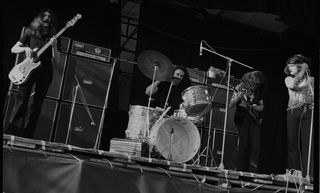
The Paranoid album raised Sabbath’s profile even further on both sides of Atlantic. On October 30, 1970, Sabbath kicked off their first US tour at Glassboro College, New Jersey.
Geezer Butler: Zeppelin had already been there and kind of opened up the gates for us, but it was like they’d just never seen anything like us before. They just went mental.
Tony Iommi: We took our own PA over but we had no cases for the speakers – so when it got there it was half in bits. It was a disaster. A roadie plugged the PA in and, of course, in America the power source is different, so it blew up.
Rick Green (promoter): They blew out not only the power in the gym, but the campus and most of the power in the neighbourhood. The street lights were out and there was darkness. Ozzy Osbourne was only 20 years old at the time. He went into the corner of the gym and started crying. He was shouting, “I hate America and I want to go home.”
Tony Iommi: Then we did the Fillmore East, and it was fantastic. We supported The Faces and we went down really well. The women seemed a lot more forward to the women back home. We didn’t know anything about groupies. It was an eye-opener.
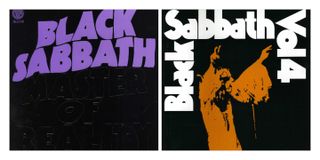
Lords Of This World: 1971-1973
Having survived their American experience, Sabbath returned to the studio to start work on their third album, Master Of Reality. It found the band experimenting musically. Most notable was Iommi’s decision to tune his guitar down by three semi-tones, making Sabbath’s sound even heavier.
Tony Iommi: We tuned down to get more power and a fatter sound. Of course, Ozzy started singing higher. He’d go, “Oh, I can reach that note now.” However, when we got onstage, he couldn’t do it.
**Bill Ward: **I was pulling off new things, such as my double bass work in Children Of The Grave.
Ozzy Osbourne: Children Of The Grave was the most kick-ass song we’d ever recorded.
Tony Iommi: I wrote Sweet Leaf in the studio. I’d come back from Dublin, and they had these cigarettes called Sweet Afton. We were going, “What could we write about?” I took out a cigarette packet, and as it’s got on the lid, ‘The Sweetest Leaf You Can Buy!’ I was like, “Ah, Sweet Leaf!”’
**Bill Ward: **That’s about having a relationship with marijuana. That was part of our lifestyle then.
Tony Iommi: At the start of the song, that’s me bloody choking. I was in the studio doing this acoustic thing, and Ozzy rolled this big joint and brought it out. I had a couple of puffs and nearly choked myself. They left the tape running, and it turned into the ideal start for Sweet Leaf.
Tom Allom (sound engineer): What Bill and Geezer were doing together was incredible, actually. They were almost a jazz band, really.
Tony Iommi: We tried recording Into The Void in a couple of different studios because Bill couldn’t get it right. Whenever that happened, he would start believing that he wasn’t capable of playing the song. He’d say, “To hell with it – I’m not doing this!”
Geezer Butler: Tony was the great leveller. He steered the ship in the right direction. If there were four Ozzys, we never would’ve gotten anywhere.
Tony Iommi: I didn’t want to be the boss as such. It was just that they looked to me as a leader. I came up with the ideas and if anything happened I was the one that they’d come to. The same in the studio: they’d go home and I’d still be in there. I wanted the music to the best it could be, and I was worried to leave it in other people’s hands.
**Billy Corgan (Smashing Pumpkins): **Master Of Reality changed the way I thought when I was eight years old. I’d picked it up from my uncle. The album looked so cool with its dark, evil colour. It sounded so heavy. Okay, the lyrics are pretty hit or miss. Never has a man rhymed ‘insane’ with ‘brain’ so many times. But the music is amazing.
Things were changing gear for Sabbath, especially in the US. The press still hated them, but the kids couldn’t get enough. Master Of Reality was certified gold on advance orders alone in the States. In July 1971, they set off on a US tour, supported by Yes.
Rick Wakeman (keyboards, Yes): I was a serious drinker, as were all of Sabbath, so we got on like a house on fire. They had a seat on their private plane, so I’d travel with them. You literally couldn’t move for booze. Ozzy was putting away as much as me – which was as much as humanly possible.
Tony Iommi: The first time I tried coke was at the LA Forum in 1971. I said to one of the crew, “I really feel tired tonight.” He said, “Why don’t you have a line? It’ll perk you up.” I’d been around it for a while, but I’d never taken it. I only had a little bit. One line. But it felt great.
Bill Ward: We were getting into coke, big time. Uppers, downers, Quaaludes, whatever you like. It got to the stage where you’d come up with ideas and forget them, because you were just so out of it.
Tony Iommi: The success happened so quickly, but we just went along with it. The only thing that messed with our heads was the drugs.
There were other, more unexpected, distractions. The band’s unwarranted reputation as occultists drew a peculiar strain of fan.
Tony Iommi: We had all sorts of weird people coming to the gigs in America – witches, all sorts. People came to our hotel with black cloaks on, lighting candles. Some of those religious weirdos were as dangerous as the Ku Klux Klan.
Ozzy Osbourne: The Satanists never stopped being a pain in the arse. We were playing Memphis and this bloke in a black cloak ran on stage.
Tony Iommi: When we’d got to the gig, somebody had painted a cross on a door in red. We didn’t think much else of it. But later on we found out this bloke had cut his hand and drawn the cross in his blood. He was some religious freak. During that show, my amps were playing up and I really got pissed off. I kicked my stack over and walked off. And as I’m walking off, this bloke’s behind me. He’d got past security but somebody managed to jump on him. I didn’t know what was happening. I was still moaning about my gear.
Ozzy Osbourne: Before I knew it, one of our roadies was running on stage with a metal bar raised above his head, and he twatted the guy in the face. The satanic bloke was lying on the stage with his cloak wide open. In his right hand was a dagger.
Tony Iommi: It was only afterwards that I found out this bloke was trying to bump one of us off.
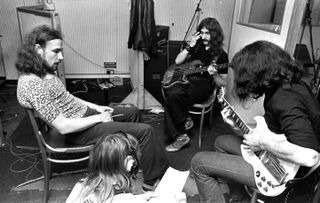
The first few years of Sabbath’s existence had been a whirlwind, but by 1972 it was rapidly becoming a blizzard. When it came to recording their fourth album, Vol. 4, the band decamped to LA, where sunshine and cocaine were in plentiful supply.
Tony Iommi: We lived in a beautiful house in Bel Air. It had a ballroom and bar leading out to the garden. We rehearsed in the bar. We never thought that all the sound was going out across the valley.
Geezer Butler: Half the budget went on the coke and the other half went to seeing how long we could stay in the studio.
Tony Iommi: We had coke flown in especially. You’d peel the wax off and there were these phials of coke. And bloody hell, it was great, the cocaine in those days. We’d sit up all night, gassing.
Ozzy Osbourne: That coke was the whitest, purest, strongest stuff you could ever imagine. One sniff, and you were king of the universe.
Tony Iommi: We used to write in the day and jam at night. It was a great atmosphere. We had a fabulous time. In this ballroom there was a grand piano. I’d never played piano before. And I learnt to play and the first thing I wrote on it was Changes.
Ozzy Osbourne: Tony just sat down at the piano and came up with this beautiful riff. I hummed a melody over the top, and Geezer wrote these heartbreaking lyrics about the break-up Bill was going through with his wife.
Tony Iommi: One day I took my guitar off and put it on the stand, and as I put it down it went, BOING! And I can’t think for the life of me why we ended up taking our clothes off, but that’s how we recorded FX, prancing around, naked, banging the guitar. We were stoned, of course.
**Bill Ward: **I hated the song Cornucopia. There were patterns that were just horrible. I nailed it in the end, but I got the cold shoulder from everybody. I felt like I’d blown it, I was about to get fired.
Tony Iommi: Vol.4 was such a complete change, we felt we had jumped an album, really. It didn’t follow suit, because we had tried to go too far. We had reached the limit as far as we wanted to go.
James Hetfield (Metallica): I discovered Black Sabbath by digging through my older brother’s record collection. I couldn’t believe it. It was like, “Whoa! Heavy as shit.” Sabbath was everything that the Sixties weren’t. Their music was so cool because it was completely anti-hippie.
The drugs may have seemed like fun at the time, but they were causing problems. During a gig at the Hollywood Bowl on the Vol. 4 US tour, Iommi collapsed and the rest of the tour was cancelled.
Ozzy Osbourne: Tony had been doing coke literally for days – we all had, but Tony had gone over the edge. He walked off stage and collapsed.
Geezer Butler: It was really touch-and-go whether he’d survive or not because he was totally depleted. So we had to cancel the rest of the tour and we actually took time off for the first time since the band started. We got away from each other.
Sabbath’s heavy workload, combined with their spiralling drug use, were convenient distractions for the band’s management, who bought out of the remainder of the band’s recording contract in order to exert more control over the band.
Tony Iommi: When it came to money, we were always fobbed off. Up to that point, anything we wanted, we’d get it. If I wanted a new Rolls-Royce, I’d phone up the office and say, “I’ve seen this car.” And it would arrive the next day. We were kept quiet. And in the meantime, we were kept working.
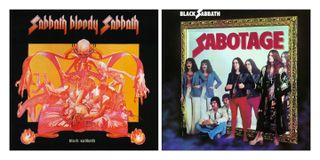
Wheels Of Confusion: 1973-1975
The chaos surrounding Sabbath was growing, but for the four working-class Brummies in the eye of the hurricane, it looked like the party was never going to end. After an abortive attempt in the summer of 1973 to make a follow-up to Vol. 4 in LA, the band instead hired Clearwell Castle, a gothic mansion in the Forest of Dean.
Tony Iommi: We wanted to go somewhere out of the way, so we wouldn’t have people turning up. There were dungeons in the basement and that’s where we set up the gear. As soon as we got down there, Sabbath Bloody Sabbath was the first track I came up with. The whole vibe in those dungeons made me come up with that riff.
Slash (guitarist, Guns N’ Roses): The outro to Sabbath Bloody Sabbath is the heaviest shit I have ever heard in my life. To this day, I haven’t heard anything as heavy that has as much soul.
Geezer Butler: The song A National Acrobat was just me thinking about who selects what sperm gets through to the egg; Spiral Architect was about life’s experiences being added to a person’s DNA to create a unique individual. I used to get very contemplative on certain substances.
David Tangye (Sabbath roadie): One sunny day we returned to the castle with flagons of cider and carried on to the early hours. Ozzy had banked the fire up in the hearth of a large living room. After having crashed out, we were awakened by the smell of burning. Ozzy’s flares were on fire from a burning ember. We rapidly doused his pants with cider.
Tony Iommi: One night Geezer and me were walking along this hallway and it had an armoury at the end of it. We saw someone going into the armoury: “Who the fuck’s that?” When we went in we couldn’t find anybody. We spoke to the owner of the castle, who said, “Oh, that’s the castle ghost.”
Ozzy Osbourne: We weren’t so much the Lords Of Darkness as the Lords Of Chickenshit when it came to that kind of thing. You’d just lie there with your eyes wide open, expecting an empty suit of armour to walk into your bedroom at any second to shove a dagger up your arse.
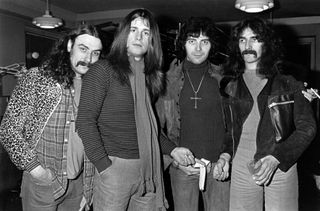
Sabbath Bloody Sabbath was completed at Morgan Studios in Willesden, North London. Yes were recording Tales From Topographic Oceans in the next studio, and Sabbath enlisted Rick Wakeman to add harpsichord to Sabbra Cadabra.
Rick Wakeman: Was Ozzy going off the rails? I don’t think he was ever on the rails. Actually, he’s very clever, because he’s got a knack of appearing to be out of control, while actually being perfectly in control. I never saw him too wasted to perform.
Ozzy Osbourne: Sabbath Bloody Sabbath was really the album after which I should have said goodbye. Because, after that, I really started unravelling. We ended up falling out of favour with each other.
Released in December 1973, Sabbath Bloody Sabbath, was their most progressive album to date. But in the UK, where glam rock ruled, interest was waning and Sabbath Bloody Sabbath only made No.11 in the album charts. It was a different matter in the States. On April 6, 1974, the band appeared before 400,000 people at the California Jam in Ontario, California, alongside ELP, The Eagles and Deep Purple.
Glenn Hughes (bassist, Deep Purple): The day before I spent with Tony and Ozzy, doing lines and drinking beer. We were up all night and Sabbath played before us at Cal Jam. I remember flying in on the helicopter and Sabbath were on stage.
Tony Iommi: We hadn’t played for a few months, which was a long time for us. But it was really great. One of the best shows we ever did.
Don Branker (promoter, California Jam): Sabbath had no lights, no tricks, they had no pyro, no anything, and I probably watched the greatest show I’ve ever seen in my life. Ozzy took the quarter-million people on a trip.
**Richard Ogden (Sabbath’s publicist): **When I started looking after Sabbath they were huge in America, but nobody in the UK took them seriously. Also, they’d found out that they didn’t have any money. They had big houses and flashy cars but they didn’t actually own any of them. The money was coming in, but it had been going straight into the pockets of their manager.
Ozzy Osbourne: Patrick Meehan never gave you a straight answer when you asked him how much dough you were making.
Richard Ogden: They got rid of Meehan and didn’t have a manager. Bill seemed to be making the business decisions. He asked if I’d be interested in managing them, which didn’t appeal, as they seemed to be surrounded by gangsters and drugs.
Meehan didn’t take the decision well, and launched legal action. Exhausted and broke, Sabbath entered Morgan Studios in February 1975 to record their sixth album, Sabotage. They poured their frustration into the songs, taking the experimentation of Sabbath Bloody Sabbath to a new level.
Geezer Butler: It was called Sabotage because we felt that the whole process was just being totally sabotaged by all these people ripping us off.
Tony Iommi: We had lawyers coming to the studio with writs [from Meehan]. Then we had to go to court. So we’d be in court in the morning and in the studio in the afternoon. It was bloody awful.
Ozzy Osbourne: I wrote most of the lyrics for The Writ myself, which felt a bit like seeing a shrink. All the anger I felt towards Meehan came pouring out.
Geezer Butler: Ozzy was asleep in the bar most of the time. And that’s how he carried on.
Tony Iommi: We could’ve continued and gone on and on, getting more technical, using orchestras… which we didn’t particularly want. We took a look at ourselves, and we wanted to do a rock album.
David Tangye: [Roadie] Graham Wright designed the cover. It was supposed to be in a castle, with them dressed in black, but it didn’t work out. They did it in a studio. Bill had his wife’s tights on, and Ozzy got nicknamed ‘The Homo In The Kimono’.
Gerald ‘Jezz’ Woodroffe (touring keyboard player): My first gig was July 14, 1975, in Toledo, Ohio. When I was with Sabbath, a lot of the time they were relying on their support acts to draw the crowds. We toured with Kiss in 1975, and they put on a fantastic show and pretty much outshone us.
David Tangye: Ozzy offered me the job of his driver and personal assistant after a gig in 1975. Half an hour later I was sitting at the wheel of a new Mercedes on my way to his farmhouse in Staffordshire. He lived there with his wife Thelma and three children. John Michael Osbourne, family man, and Ozzy Osbourne, rock star, were two different entities totally. He was a loving parent to his kids. He took them to Blackpool for a holiday. You don’t get much more family man than that.
Jezz Woodroffe: At Hammersmith Odeon, Meehan turned up with all these heavies, extremely scary guys. There were shooters and stuff around.
David Tangye: We ended up abandoning most of the British leg of that tour because Ozzy fell off a child’s motorised bike and he pulled some muscles, did some damage to his back. He was always tearing about on motobikes.
The band returned to active service in December 1975, kicking off a US tour at Madison Square Garden, supported by Aerosmith. With their backs against the wall, there was a bunker mentality in the Sabbath camp.
David Tangye: I was setting the stage up, putting on the drinks and towels and other bits for the band. I suddenly saw this black shape hitting the edge of the stage. It was a guy who had jumped off the balcony, trying to jump on to the stage, and he missed. He had to be carried away on a stretcher and I think he died.
Richard Ogden: They were always playing practical jokes. Bill wore plimsolls onstage, but when he came off at the end of the show he’d put on a dressing gown and slippers. At The Kursaal in Southend they put bananas in his slippers. It had obviously happened before, because I remember him going, “Bloody ’ell, not again.” And the rest of them laughing their heads off.
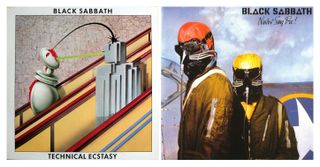
Into The Void: 1976-1978
Wrapped up in drink, drugs and business issues, Sabbath didn’t notice a new generation of bands about to blindside them. In mid-1976, they decamped to Miami to record their seventh album, Technical Ecstasy, unaware of their own impending obsolence.
Tony Iommi: Maybe that wasn’t such a good idea. We all stayed in a place right on the beach, and I’d go down to the studio and nobody would be there. The Bee Gees were recording there too, and I spent a lot of time hanging out and doing coke with Barry Gibb. And The Eagles were there, too, in the room next to us. They had to pack up because we were too loud.
Geezer Butler: Before we could start we had to scrape all the cocaine out of the mixing board.
Jezz Woodroffe: Ozzy had very little to do with the writing of the songs. Tony did the riffs, Geezer wrote most of the lyrics . The last thing done would be Ozzy putting some vocals over the top.
Ozzy Osbourne: Tony was always saying, “We’ve gotta sound like Foreigner”, or “We’ve gotta sound like Queen”. I thought it was strange that the bands we’d once influenced were now influencing us.
Geezer Butler: We didn’t know what we were doing. You could feel the whole thing falling apart.
Tony Iommi: That album was different from the others, but I did like it.
After completing Technical Ecstasy, Ozzy flew back to Britain and checked himself into an asylum.
Ozzy Osbourne: I checked myself into a loony bin called St George’s. It was a big old Victorian place. The first thing the doctor said was, “Do you masturbate, Mr Osbourne?” I told him, “I’m in here for my head, not my dick.” I didn’t last long.
Ozzy wasn’t the only one having trouble. Bill Ward’s own issues were beginning to build.
Jezz Woodroffe: That summer, Bill invited me to his house several times. He wouldn’t get up. He’d spend the day in bed talking business to people in LA on the phone. All he wanted me to do was sit downstairs and play the piano in his front room.
Ward’s problems came to a head when Sabbath set off for a US tour in October 1976, with Boston as the support act.
Jezz Woodroffe: When we got to Bill’s to pick him up for the airport, he was wearing red tights, a T-shirt and a leather jacket. When the crew asked where his luggage was, he said, “This is it.” A plastic bag full of tights and three T-shirts. When we got to America, it was minus 10 degrees outside but Bill was still wearing tights and a T-shirt. The hotel porter asked, “Is he with the band?” We said, “No, never seen him before.” They wouldn’t let him through the door.
Frank Zappa: I was going to jam with them at Madison Square Garden. They were supposed to tell me what time their soundcheck was, but I guess they didn’t have one. So, I went to the show and they said, “What are you going to play?” They’d set up a mini-wall of Marshalls for me. And I said, “I’m not going out there without knowing what it’s going to sound like.” I said I’d just watch the show. Tony Iommi had some trouble with his guitar and decided to change his strings at the last minute. The audience had already been waiting for an hour and they wanted me to go out there and make an announcement and calm them down. So I did.
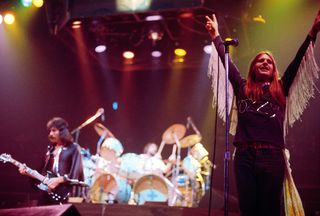
In the competition between Ozzy and Ward to see who could go crazy first, the singer was winning by a nose. When they reconvened in November 1977 to rehearse for a new album, Ozzy snapped.
Jezz Woodroffe: Ozzy had got to the point where he really didn’t want to do it any more. On the last tour I did with them, I remember seeing him being pushed on to the stage by a roadie.
David Tangye: Ozzy had a big field out the back of his house, and another one down the road which a football team used as their pitch. One time, Ozzy asked them to take down their goalposts and they didn’t do it, so he went down and shot the posts down with his pump-action shotgun. Blasted them to bits.
Ozzy Osbourne: We had a few internal problems. My father was dying, so that put us out for three months with the funeral and everything.
Tony Iommi: Ozzy went through a bad patch and he was unhappy. It wasn’t working for him, so he just left.
David Tangye: Ozzy hadn’t gone back down to rehearsals at Rockfield. Tony continued working on riffs, but he was getting more and more frustrated with not having a singer around, so Dave Walker, an old friend of Bill and Tony’s, was brought in, but he wasn’t Sabbath material. For one thing, his wife liked him to be in bed early.
Tony Iommi: It didn’t feel right with Dave Walker. We were such a unit before, and when somebody new comes in it was really uncomfortable.
At the start of 1978, Ozzy returned to the fold. But the fresh start they were hoping for didn’t materialise. With Ozzy refusing to sing any songs his bandmates had written with Dave Walker, Sabbath flew to Toronto to record their eighth album, Never Say Die!
Tony Iommi: I don’t know how we got that album done. I booked the studio out in Toronto, never having seen it in my life, because the Stones had used it. It was too plush. I had all the carpet ripped up because it just sounded dead in there. We had to rehearse in the morning at this cinema, and it was fucking freezing cold. And then at night we’d go into the studio to record. You wanted to live with the songs for a little bit. So it was very hard to put that album together, very frustrating for us all.
Geezer Butler: It was horrendous. We were in Toronto, broke, miserable and freezing to death. It was minus 18 or something, and I got this cold in my ear and went totally deaf, so everything that I was playing sounded like it was underwater.
Tony Iommi: We were getting really drugged out. We’d go down to the sessions and have to pack up because we were too stoned. We were all over the place. Everybody was playing a different thing.
Geezer Butler: He’d gone nuts, Bill. He was dressing up as Hitler in the studio. One day he passed out in the studio, so Tony put all of this black gaffer tape on his head, as if it were a Hitler haircut. When Bill came round from, he realised that his head was stuck down with tape.
Ozzy Osbourne: I’d go down to the studio and I’d hear what sounded like a jazz band playing. Is this really Black Sabbath? I’d just fuck off.
**Bill Ward: **In the circumstances, I thought we did the best we could. We were taking care of business ourselves, we didn’t have millions from the record company, and we tried to experiment with jazz and stuff the way we had in the early days. Songs like Johnny Blade and Air Dance I still like.
Geezer Butler: I like Air Dance. It was a great track, and totally different to what we’d normally do. But even if they were the best songs we’d ever done, I’d still get a bad feeling from listening to that album.
Ozzy Osbourne: It was the worst piece of work that I’ve ever had anything to do with. I’m ashamed of that album. I think it’s disgusting.
Electric Funeral: 1978-1979
Even through the haze, Sabbath knew that their time was almost up. On May 16, 1978 , they kicked off the eight-month Never Say Die! tour in Newcastle. Their support band was a fast-rising band from LA named Van Halen, whose debut album had given rock a shot in the arm. The tour represented a changing of the guard.
Tony Iommi: Van Halen were really hot to trot, whereas we were burning out. They were great musicians, energetic on stage. Eddie was a great player. But that tour was difficult. We hit a wall.
Geezer Butler: Ozzy thought that David Lee Roth was ripping him off every night, which he was. Our record company, Warner Brothers, had put everything into Van Halen. They were getting limos everywhere, and we hardly had any money back then. We’d just got rid of our management, paying horrendous legal bills and everything. The record company didn’t believe in us anymore. And by the end of that tour, Ozzy was in pieces.
After a rollercoaster decade, Sabbath were riddled with debt, locked in a cycle of drugs and alcohol, and utterly spent. At the end of April 1979, having come to the conclusion that Ozzy’s behaviour had made him impossible to work with, they sacked their singer. Bill Ward was sent to pull the trigger.
Ozzy Osbourne: We were doing some rehearsals in LA, and I was loaded, but then I was loaded all the time. It was obvious that Bill had been sent by the others, because he wasn’t the firing type. I can’t remember exactly what he said to me, but the gist was that Tony thought I was a pissed, coked-up loser and a waste of time for everyone concerned.
Tony Iommi: Ozzy seems to think it was me who pushed it, but I was only speaking on behalf of the band and trying to get the thing going.
Geezer Butler: Ozzy was incapable of working. He was 100 per cent out of his brains all the time.
Tony Iommi: I got in touch with Ronnie James Dio – through Sharon [Arden, later Ozzy’s wife], I might add. As soon as we heard Ronnie sing with us, we knew he was the right man.
Ozzy Osbourne: I couldn’t imagine someone singing for that band that wasn’t me. It takes a long time to get that into your head.
Never Say Die: 1980-2015
The two parts of Black Sabbath’s original – and greatest – line-up took divergent paths. After an initial burst of success with Ronnie James Dio, Iommi soon found himself steering the Sabbath ship alone for the next two decades with
a rotating cast of singers. Conversely, the supposedly washed-up Ozzy Osbourne became one of the most successful artists of the 80s and 90s.
By 1998, they’d put aside their differences for a pair of triumphant homecoming gigs at Birmingham’s NEC, though it would take another 15 years for them to record an album together. That record, 13, was a fitting testament to Sabbath’s legacy, though it could never have the same impact as the music they made during that crazy, chaotic, groundbreaking decade – the 70s –where everything changed.
Tony Iommi: We understand each other, although a lot of people think we don’t. You have disagreements over the years, some hurtful things have been said, but it all gets sorted out in the end. And we stayed in touch. That’s the main thing.
Ozzy Osbourne: I never thought we’d last. It’s part of the reason why I went for it so hard. I thought, “One album, that’ll be it, then back to the factory, so make the most of it.
Additional sources: Symptom Of The Universe by Mick Wall; I Am Ozzy by Ozzy Osbourne; Iron Man by Tony Iommi; How Black Was Our Sabbath by David Tangye and Graham Wright; Mojo; Uncut; Guitar World.
